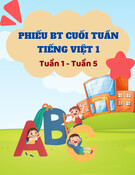
REVISION FOR THE FIRST TERM
ENGLISH 9 ( 2020 – 2021 )
A. GRAMMAR:
1. The present simple tense S + is /am /are + O
S + V1 / V- s / V-es / has+ O
Adv: always / usually / often / sometimes / everyday
2. The present progressive tense : S + is / am / are + V-ing + O
Adv: now, at the present, at the moment
3. The future simple tense: S + will + V1 + O
Adv: Tomorrow, next week, next Sunday...........
4. The past simple tense
S + was / were + O
S + V-ed / V2 + O
Adv: yesterday, last week, last Sunday, ago, in 2007.....
5. The past progressive tense S +was /were + V-ing +O
Adv: At this time yesterday, at this time last week, at 8.00 last night
6 .The present perfect tense
S+ have/ has + p.p (V-ed /V 3) +O
Adv: just, already, ever, never, since, for, yet (already: is used in affirmatives, ever: in questions, yet:
in questions and negatives)
7. Passive voice: be + p.p ( past participable = V3/ed)
a/ Simple present tense
( A ) S + V1 /V -es /s + O + (M )
(P ) S + is /am are + p.p + (M ) + by + O
b/ Simple past tense :
(A ) S + V-ed /V2 + O + ( M )
(P ) S +was /were + p.p + ( M ) + by + O
c / Modal verbs : Will / shall /can / could /must/ should /may / might / have to / used to / be going to
(A ) S + Modal verb + V1 + O + (M )
(P ) S + Modal verb +be +p.p + ( M ) + by + O
d / Present perfect tense :
( A ) S + have /has +p.p + O + ( M )
( P ) S + have / has + been + p.p + (M ) + by + O
8. Reported speech / Indirect speech:
Cách chuy n t câu tr c ti p sang câu gián ti pể ừ ự ế ế
Thay đi v thìổ ề Thay đi tr ng t ch th i gian và n i ch nổ ạ ừ ỉ ờ ơ ố
Simple present Simple past This/ These That/ Those
Present progressive Past progressive Here There
Will Would Now Then
1

Must Had to Today/ Tonight That day/ That night
Can Could Tomorrow The next day/ the following day
May Might Last Before
Thay đi đi t ch ngôiổ ạ ừ ỉ : Ph thu c vào ch ng và tân ng c a m nh đ chính.ụ ộ ủ ữ ữ ủ ệ ề
I -> He /she
We -> They
He /She /they -> He /She /They
*. Statement:
S + said (to + O) / told + O: “S’ + V + …”
S + said (to + O) (that) + S’điổ + Vlùi thì + …
S + told + O + (that) + S’điổ + Vlùi thì + …
Ex: she said to me “ I will go to Nha Trang next week”
She told me ( that) she WOULD go to Nha Trang the next/following week.
*. Yes /No -question:
a) S + asked + O: “Do / does + S +V 1 + O ..........? “
S + asked + O + If /Whether + S + V 2 / V-ed + O( B tr đng t “do”/ “does” và ỏ ợ ộ ừ
chuy n đng t th ng V1 sang quá kh là V-ed ho c V2)ể ộ ừ ườ ứ ặ
Ex: Ba asked Hoa: “Do you live near here?” Ba asked Hoa if/whether she lived near there.
b) S + asked + O: “Đng t khi m khuy t nh can, will + S + O ..........? “ộ ừ ế ế ư
S + asked + O + If /whether + S + đng t khi m khuy t QK + V1+ O.ộ ừ ế ế ở
Ex: Hoa asked Ba: “Can you do this exercise?” Hoa asked Ba if/whether he could do that exercise.
c) S + asked + O: “Is/are/am + S..?”
S + asked + O + If /whether + S + was/were…
Ex: He asked me: “Are you a student?” He asked me if/whether I was a student.
* . Wh-question:
S + asked + O : “Question word + Do / does + S +V 1 + O ..........? “
S + asked + O + Question word + S + V 2 / V-ed + O. ( B tr đng t “do”/ “does” và ỏ ợ ộ ừ
chuy n đng t th ng V1 sang quá kh là V-ed ho c V2)ể ộ ừ ườ ứ ặ
Ex: Ba asked Hoa: “What do we have for this breakfast?” Ba asked Hoa what they had for that breakfast.
S + asked + O : “Question word+đng t đc bi t + S + O ..........? ộ ừ ặ ệ “
S + asked + O + Question word + S + đng t đc bi t QK + V1+ O.ộ ừ ặ ệ ở
Ex: Ba asked Hoa: “What can we do now?” Ex: Ba asked Hoa what they could do now.
*Chú ý d ng câu đ ngh , yêu c u, khuyên ngăn:ạ ề ị ầ
S + asked/told/adviced + O + to V-inf
Ex: “ Can you open the door?” she said
- She asked me to open the door.
“ don’t make noise, please” he said to her.
- He told her not to make noise.
9. Wish- sentences: (Câu m c)ơ ướ
- About present: S + wish/ wishes + S + were / V-ed / V2 + O.
- About an ability in the future: S + wish/wishes + S+ could/would + V1
- Di n t câu c không có th t hi n t iễ ả ướ ậ ở ệ ạ
Câu th c t :ự ế Câu m c:ơ ướ
2

Can Could not
Can’t Could
Is / am / are were + not
Is / am / are + not were
V1 / V-s/es Didn’t + V1
Don’t / doesn’t+ V1V2/ V-ed
Ex: I can’t speak English fluently. I wish I could speak English fluently.
10. Conditional sentence: Type 1 (Câu đi u ki n)ề ệ
If- clause Main –clause
S + V1 ( present simple tense ) S + will/ can / should / must / might / ought to + Vbare
Ex: If I have money, I will buy a new car.
You should hurry if you don’t want to be late.
Unless = If..not: n u khôngế
11. Adverb clause of result: nên, vì v y ậso / therefore + clause
Ex: Ba went to bed early because he was tired.
Ba was tired, so he went to bed early.= Ba was tired; therefore, he went to bed early.
12. Tag- questions: (Câu h i đuôi)ỏ
S + đng t đc bi tộ ừ ặ ệ + (V ) + O, đng t đc bi t ộ ừ ặ ệ + not + S?
(You will be free tomorrow, won’t you ?)
S + đng t đc bi tộ ừ ặ ệ +not + (V ) + O , đng t đc bi t ộ ừ ặ ệ + S ?
(You can not speak E, can you ?)
S + V1 / V-s/es + O, don’t / doesn’t + S?
S + V2 / V-ed + O, didn’t + S?
S + don’t / doesn’t / didn’t +V1 + O , do / does / did + S ?
* Note: - Câu h i đuôi ph đnh pha vi t hình th c vi t t tỏ ủ ị ỉ ế ở ứ ế ắ
- N u ch ng trong câu tr n thu t là danh t , câu h i đuôi ph i dùng đi t thay thế ủ ữ ầ ậ ừ ỏ ả ạ ừ ế
Ex: Lan is a student, isn’t she?
Ex: Ba can swim, can’t he?
Đc bi t: Let’s … , shall we?ặ ệ
13. Gerund after some verbs:
S + like / love / enjoy / dislike / hate / mind / start / finish/ practice/ suggest ...+ V-ing + O.
14. Prepositions of time: In, on, at, from...to, until = till, up to, between ...and, after, before
15. The structure: It + takes/took + (s.o) time + To-V
It takes me 30 minutes to go to school on foot.
B. VOCABULARY: From unit 1 to unit 5
C. SKILLS:
I. Reading: Đc hi u m t s đo n văn vi t v c nh quan , phong t c t p quán c a m t s n c ọ ể ộ ố ạ ế ề ả ụ ậ ủ ộ ố ướ
Đông Nam Á; v trang ph c ; v nông thôn, m t s ho t đng và sinh ho t c a ng i dân làng ề ụ ề ộ ố ạ ộ ạ ủ ườ ở
quê; vi c h c ngo i ng ; v các ph ng ti n truy n thông ( báo chí , truy n hình, truy n thanh, ệ ọ ạ ữ ề ươ ệ ề ề ề
internet,….)và làm các d ng bài t p đc hi u sau:ạ ậ ọ ể
+ True / False
+ Answer the questions
+ Choose the correct answer
+ Complete the sentences using the information from the passage
+ Complete the summary using the information from the passage
3

+ Fill in each numbered blank with a suitable word from the box
II. Writing:
1. Write about a trip to the countryside
2. Wearing uniforms or casual clothes to school
3. What should we do to learn English effectively
4. The benefits of using the Internet in a write way
D. EXERCISES:
I. Choose the best answer:
1. The Ao dai is the _____ dress of Vietnamese women.
A. casual B. religional C. international D. national
2. That kind of microorganism was named _____ the scientist finding them out.
A. by B. after C. on D. of
3. She’s taught here since she _____ from university.
A. graduates B. graduated C. was graduated D. would graduate
4. There is a big banyan tree at the _____ the village.
A. mountain of B. river bank in C. shrine at D. entrance to
5. No one has _____ forgotten the terrible earthquake in 1909.
A. ever B. never C. already D. yet
6. I think it’s necessary for students _____ uniform at school.
A. wear B. will wear C. to wear D. should wear
7. You should not go to that meeting _____ an invitation.
A. unless B. without C. except D. instead of
8. Your children never go out in the evening, ______?
A. do they B. don’t they C. doesn’t he D. does he
9. We have many well - ______ teachers.
A. qualify B. quality C. qualified D. qualification
10. If you are not a teacher, please ______ around this area.
A. not go B. don’t go C. won’t go D. can’t go
11. We often go to the mosque to pray because our religion is ______.
4

A. Islam B. Buddhism C. Hinduism D. Taoism
12. We have some ______ students for the program.
A. exchange B. exchanged C. exchanging D. change
13. The weather is nice. Shall we ______ the mountains this morning?
A. go B. travel C. jump D. climb
14. He is considered to be one of the greatest ______ of the country.
A. heroes B. heroins C. heroines D. heroics
15. What ______ of learing English do you find most difficult?
A. aspects B. sizes C. situations D. things
16. I can complete a ______ English test if it’s necessary.
A. speak B. speaking C. spoken D. spoke
17. I find it very ______ to stay at home by myself in the evening.
A. frighten B. frightening C. frightened D. frightenal
18. A photocopier is a machine which is used ______ copies of documents.
A. make B. making C. to make D. to be made
19. By the time I ______ at the airport, my family will have waited for me there.
A. arrive B. am arriving C. will arrive D. have arrived
20. The Ao Dai consists of a ______ that is slit on the sides and worn over loose pants.
A. long tunic silk B. tunic long silk C. long silk tunic D. silk long tunic
21. Sorry we can’t afford ______ you to a reputable high school.
A. send B. to send C. sending D. sent
22. Malaysia is divided ______ two parts by the sea.
A. with B. about C. into D. from
23. Mr. Parker had about eleven jobs ______ various times of his life.
A. at B. in C. on D. of
24. The English can’t drive on the left, ______?
A. does he B. can he C. do they D. can they
25. The weather is not fine, so I can’t go out. If only it ______ fine!
A. was B. were C. would be D. had been
II. Supply the correct form of the words in brackets:
5



![Tài liệu tham khảo Tiếng Anh lớp 8 [mới nhất/hay nhất/chuẩn nhất]](https://cdn.tailieu.vn/images/document/thumbnail/2025/20250806/anhvan.knndl.htc@gmail.com/135x160/54311754535084.jpg)










![Phiếu bài tập cuối tuần Tiếng Việt 1 tuần 2 đề 2: [Hướng dẫn chi tiết]](https://cdn.tailieu.vn/images/document/thumbnail/2025/20250728/thanhha01/135x160/42951755577464.jpg)

